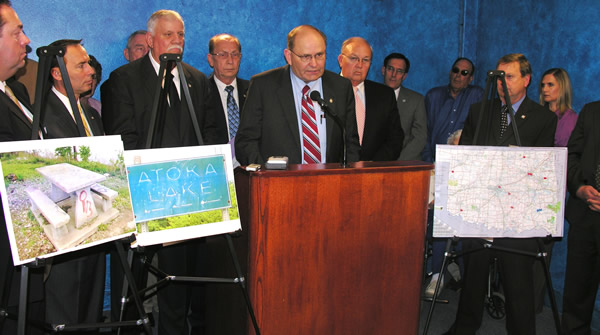In order to provide equal access and equal opportunity to people with diverse abilities, this site has been designed with accessibility in mind. Click here to view
Southeastern Oklahoma Lawmakers Decry Secret Grab for Control of Sardis Lake
 Sen. Jerry Ellis and Sen. Jim Wilson along with their colleagues in the Democratic Caucus protested plans by Oklahoma City to purchase the water of Sardis Lake Tuesday at the State Capitol.
Sen. Jerry Ellis and Sen. Jim Wilson along with their colleagues in the Democratic Caucus protested plans by Oklahoma City to purchase the water of Sardis Lake Tuesday at the State Capitol.
State Sen. Jerry Ellis, D-Valliant, and Sen. Jim Wilson, D-Tahlequah, are protesting plans by Oklahoma City to purchase the water of Sardis Lake—plans they say would be premature, given a statewide water study mandated by the State Legislature will not even be completed for another two years.
Ellis said he wrote to Gov. Brad Henry in February expressing his opposition to any agreement to transfer water prior to the completion of the study. He also asked to be included in future discussions dealing with Sardis Lake as it is located in his district, but received no response whatsoever.
“We don’t even know what the true dollar value of this water is—much less the economic and environmental impact such a transfer would have on the southeastern counties of our state,” Ellis said. “Just as objectionable is the fact that this agreement seems to be in the hands of the state’s Water Resources Board which does not have a single member from our area.”
The situation is further complicated by the fact that Sardis Lake has been the subject of a federal lawsuit originally filed in 1998 over unpaid costs of construction of the lake. A settlement was reached last year for more than $27 million. A payment of more than $5 million must be made by July 1.
“Of course Oklahoma City has expressed their willingness to make the payment and take control of the water. But, we have another offer from the Choctaw Nation,” said Sen. Jim Wilson, D-Tahlequah. “Given the track record of water deals between Oklahoma City and southeastern Oklahoma, we’re much more inclined to believe the Choctaws have our best interest at heart.”
Wilson and Ellis pointed out water from Atoka Lake and McGee Creek is already being transferred to Oklahoma City. The surrounding region was promised economic development and jobs. “But all we got in the end were some picnic tables. That was it,” Ellis said.
“Without a doubt, Sardis Lake is an invaluable resource in what is probably the poorest part of Oklahoma. Unfortunately, there are people in power who are more willing to exploit that poverty at pennies on the dollar,” Wilson said.
Suggestions that Kaw Lake could be a viable alternative to provide water to Oklahoma City instead of Sardis Lake have also been ignored.
The lawmakers said they want three things to occur on behalf of the citizens of southeastern Oklahoma. First, the legislators want to ensure no agreement is made until the statewide water study is completed. Secondly, they want the make-up of the Water Resources Board to be revised so that citizens from southeastern Oklahoma have representation in future discussions. Thirdly, the lawmakers want to make sure that any negotiations on use take into account future, additional needs by the region in promoting their own economic development and growth.
“We need to make sure that any plans made take into account the fact that economic development in southeastern Oklahoma means we will need to plan for greater water use than we currently need,” Ellis said. “If Oklahoma City is allowed to take it all away now, then the people of southeastern Oklahoma will be robbed of the opportunity to create a better life for future generations.”
 Oklahoma Senate
Oklahoma Senate

